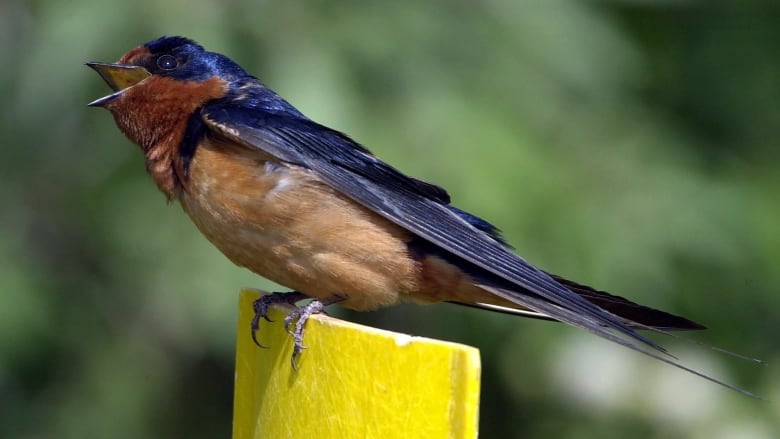'Awareness is growing': How a few small deeds can help songbirds survive
90-minute documentary about songbirds to be screened at UPEI on Thursday

The Atlantic Veterinary College's Wildlife Service and the Island Nature Trust are working together to raise awareness about the plight of songbirds.
There's been a decline in migratory birds since the '70s — with a number of them now listed as species at risk on P.E.I.
- A third of birds in North America threatened with extinction
- Threatened bank swallows get extra protection in P.E.I. National Park
Fiep de Bie, with the AVC, and Megan Harris, with Island Nature Trust, want to inform Islanders on ways to help the endangered animals.
"Particularly with migratory birds, there's a sense that the root causes and challenges are so overwhelming that we can't do anything locally that's going to make any kind of an impact," said Harris.
"That's really not the case."
She said there are many small things people can do that, if done consistently, can really "add up to something big" to help migratory birds.
Enhance your garden, keep cats indoors
de Bie said many birds die because they've been hit by cars or flown into windows. But one of the main bird killers is cats.
"Cat attacks are very big, and a lot of birds die because of this," she said. "Some people release the bird from the cats mouth but that doesn't mean the animal survives."
By keeping cats indoors, or at least leashed and watched when they're outside, it can really cut back on the amount of birds that are attacked and killed, she said.
Other ways to help birds include enhancing your garden to make "a nice natural area so that when birds return from migration that they have a safe place to go," she said.
"You can plant native shrubs and trees, you have food for the animals which create a nice area where you have insects as well."

Bird feeders are probably something to avoid in the summer months, she added, because of the outbreak of trichomoniasis — which is mainly an infection in the mouth and throats of birds, making them unable to swallow.
People can also avoid cutting down trees during the bird's breeding season, she said.
In an effort to help protect grassland birds, including a threatened species called the bobolink, about 40 farmers on P.E.I. delayed their first cut of hay this summer across the Island.
And it's small efforts like these that add up to make quite a large difference in saving the birds. "Awareness is growing, it's just baby steps," Harris said.
To help spread awareness even more, Island Nature Trust is hosting a screening of the film The Messenger. The 90-minute documentary chronicles the plight of songbirds and their fight to survive in North America.
The movie will be shown at UPEI's Duffy Science Centre at 7 p.m. on Thursday and will be followed by a 30 minute question-and-answer period with bird experts.
"It's quite a sobering film, there's a lot of quiet moments at the end of it where people are doing some soul searching," Harris said.
There is no fee to attend the event, but both organizations will be accepting donations at the screening to continue their work in protecting birds and other wildlife on P.E.I.
More P.E.I. news
With files from Laura Chapin